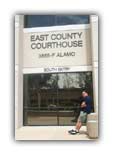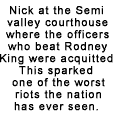 |





The Shooting of Amadou Diallo
Police Abuse
American Civil Liberties Union
|
 |

The Violence Behind Police Brutality

Imagine coming home from a long day at work, and that right before coming into your apartment you are surrounded by four police officers. They tell you to "stop, put your hands up in the air." With your wallet in hand you stop and follow the directions. Before you have a chance to say anything, the police open fire on you. You fall to the ground and die almost immediately.
This actually happened to a West African immigrant named Amadou Diallo. Diallo was a street peddler in New York City. He came home from work one day in February of 1999 and was surrounded by four of New York's police officers, working for the street crime unit. What happened when the four police officers asked Diallo to "stop and put your hands in the air" is much debated. The officers say that Diallo "was making a gesture with his hands that led them to believe that Diallo was reaching for a gun" The officers are the only witnesses. Regardless of what actually happened, the four police officers opened fired on Diallo. They shot 41 times and hit Diallo 19 times. When it was all over, they realized that Diallo was unarmed and only had his wallet in his hand. Diallo died on the scene.
|

Easter at the Grand Canyon
|
Forty-one times! I can understand if they thought Diallo had a gun, but shooting 41 times and hitting him 19 seems a little excessive. I guess New York City apartment buildings are "shoot to kill zones" these days. It sure seems that way in the case of Amadou Diallo. That February night two of the officers fired 16 bullets each, emptying their 9 mm, semiautomatic handguns in less than five seconds. The others fired their similar guns four and five times. They were standing about 15 feet from Diallo.
The four police officers went to trial and were acquitted of all charges of second-degree murder. The acquittal caused uproar in New York City, as well as all across America. Almost immediately, people in NYC took to the streets in protest. People felt like this was a racial motivated murder, because Diallo was an African American man killed at the hands of white police officers. Huge support for Diallo's case was felt nationwide. Citizens of all races and nationalities protested for a retrial.
The New York City Police (NYPD) stood behind their four officers. The street crime unit of the NYPD has a bad reputation of being crooked, and very hard on minorities. Critics of the police force also cited the alleged torture of Haitian immigrant Abner Louima at a police station in 1997. Four white officers were charged with attacking the black man, who was sodomized with the handle of a toilet plunger.

|
 |
Also, who can forget the famous case of the Rodney King beatings? In the early morning hours of March 3, 1991, King led the California Highway Patrol, Los Angeles Unified School District police, and the Los Angeles Police Department (LAPD) officers on a high-speed car chase in the San Fernando Valley. Once he pulled over, he and his friends were ordered out of the car. King was beaten by LAPD officers, as a sergeant directed from nearby, with approximately fifty-six baton strokes; he was also and stunned with a taser stun gun. Some of the beating was captured on an amateur photographer's videotape, a tape that was eventually viewed around the world.
Many components of the King incident are common to less-publicized cases of police brutality. There was the obvious race factor -- the officers involved in the beating were white, and King was black. The beating followed a vehicle pursuit, and once stopped, the defendant was not considered by officers to be compliant enough -- a common scenario in police beatings. Police filed inaccurate reports after the incident, not knowing that the incident had been video taped. Three out of the four officers eventually indicted for the beating had been named in prior complaints of excessive force. Ultimately, the police officers were acquitted in court and within hours riots swept through the streets of Los Angeles, causing millions and millions dollars of damage. The incident of Rodney King angered the nation, and they released that anger with riots. Horror stories from the riots are still fresh in the country's mind, and will be for a long time to come.
Like most things, police brutality is not a white and black situation. It's largely gray. An ex-police officer of the LAPD who didn't want to be named for the interview said, "When you have a low pay, high stress job you won't attract the best people for the job; it is like teachers in that sense." Police aren't super human; we have to remember that. We can't put them on too high of a high pedestal. Every time you get pulled over by the police, they bring everything that happened that day with them. For example, if earlier in the day somebody pulled a gun on them they are naturally going to be very jumpy and might be a little rough or have an attitude. We're all guilty of sometimes carrying previous incidences with us, in one case or another.
But is an act of police brutality excusable behavior? Ex LAPD officer Frank Janowicz says no: "Being a police officer is a high stress job, but when it comes to acts of police brutality there's no excuse. As humans we get stressed but as humans we keep control. An act of police brutality is just a complete loss of self-control. I've been in situations where I wanted to slam somebody right down to the cement but I kept my cool. If I can do it, so can police officers all across America." Another ex LAPD officer said "if people just followed the rules set before them they wouldn't have to deal with things like police brutality. The core problem is society. If society behaved better we wouldn't have the need for so many strict laws and strict police officers."
The sad truth of it all is that our society is a very violent place on both sides of the law -- from the laws made by politicians all the way down to the people who they affect. There's violence created by citizens of all ages and by the police. Some of it is racially motivated, some of isn't. It all boils down to that our society as a whole need to get along. We all have our bad days and we all have our good ones. Some take it to extremes, some choose not to. When reacting with one another we must think about what other people have gone through that day, not just about ourselves.
As far has directly solving the problem of police brutality, I think that the entire system needs to be revamped. Police officers need to be more closely monitored, and they need to be paid more money. It seem like the things we value most are the things we pay the least for, like education and protection. We pay the people the least that we expect the most from. As for the racially motivated beatings by police officers, it's a constant reminder that American society is still in constant growth and still trying to get out of its roots of racism. It's sadly still a part of our society, and we must continue to battle racism when ever possible. I'll leave you with a very simple but meaningful quote: "you must treat others, how you want to be treated"
Nick
Please email me at:
nick@ustrek.org
Links to Other Dispatches
Jennifer - A day at juvie - doing time in your teens
Nick - The birth of gangs: a violent reaction to poverty
Stephanie - Military boot camps for teens gone bad
Irene - Don't mess with Texas or 'Old Sparky' may call for you!
Neda - The prison industry - too many people, too many prisons
|



